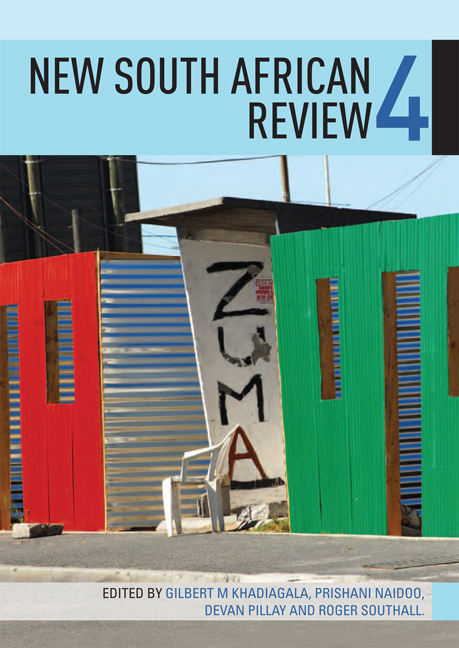Book contents
- Frontmatter
- Contents
- Preface
- Introduction: South Africa's fragile democracy: Twenty years on
- PART ONE ECOLOGY, ECONOMY AND LABOUR
- PART TWO POWER, POLITICS AND PARTICIPATION
- Introduction
- Chapter 6 Platinum, poverty and princes in post-apartheid South Africa: New laws, old repertoires
- Chapter 7 amaDiba moment: How civil courage confronted state and corporate collusion
- Chapter 8 Secrecy and power in South Africa
- Chapter 9 The contemporary relevance of Black Consciousness in South Africa
- Chapter 10 Death and the modern black lesbian
- PART THREE PUBLIC POLICY AND SOCIAL PRACTICE
- PART FOUR SOUTH AFRICA AT LARGE
- Contributors
- Index
Chapter 8 - Secrecy and power in South Africa
from PART TWO - POWER, POLITICS AND PARTICIPATION
Published online by Cambridge University Press: 21 April 2018
- Frontmatter
- Contents
- Preface
- Introduction: South Africa's fragile democracy: Twenty years on
- PART ONE ECOLOGY, ECONOMY AND LABOUR
- PART TWO POWER, POLITICS AND PARTICIPATION
- Introduction
- Chapter 6 Platinum, poverty and princes in post-apartheid South Africa: New laws, old repertoires
- Chapter 7 amaDiba moment: How civil courage confronted state and corporate collusion
- Chapter 8 Secrecy and power in South Africa
- Chapter 9 The contemporary relevance of Black Consciousness in South Africa
- Chapter 10 Death and the modern black lesbian
- PART THREE PUBLIC POLICY AND SOCIAL PRACTICE
- PART FOUR SOUTH AFRICA AT LARGE
- Contributors
- Index
Summary
‘The best weapon of a dictatorship is secrecy, but the best weapon of a democracy should be the weapon of openness.’
Niels Bohr (1885-1962: Danish physicist, Nobel Laureate)Secrecy has always been one of the most dangerous enemies of democracy. Any meaningful democracy, by its very nature, demands openness, transparency and accountability – the currencies of democratic freedom. On the other hand secrecy, as human history has so often shown, is the currency of authoritarianism (whatever the ideological variety), of social, economic and political control by those for whom the securing and maintenance of power is the ultimate goal.
Yet, despite these foundational understandings and historical experiences, all indications point to the reality that in our contemporary South Africa (and indeed our world) secrecy is back in fashion with a vengeance. While secrecy's ‘new’ look might appear different from those of the past – after all, power has regularly had to change its appearance precisely because of democratic struggles – the essence of what its mask is trying to hide has changed little.
As the WikiLeaks saga has so convincingly shown, there are few things that those in (or with) power, whether in the public or private sectors, fear more than for ordinary people to have access to the truth: the truth about how they spend (and earn) money; the truth about what they say and do behind closed doors and what they say and do in public; the truth about how decisions are made and who influences (and benefits from) those decisions; the truth about what we all simply don't know – but should.
Our early twenty-first century conundrum is that the rapid advances in information technology, networking and dissemination have catalysed an equally rapid growth of this fear-induced, suffocating secrecy industry. While there is now more information available than ever before (leaving aside the issue of the dominant character and content of that information as well as huge disparities in the ability to gain access to it), there are also more secrets than ever before and thus the intensified desire by those in or with power, to hide them.
- Type
- Chapter
- Information
- New South African Review , pp. 150 - 166Publisher: Wits University PressPrint publication year: 2014



